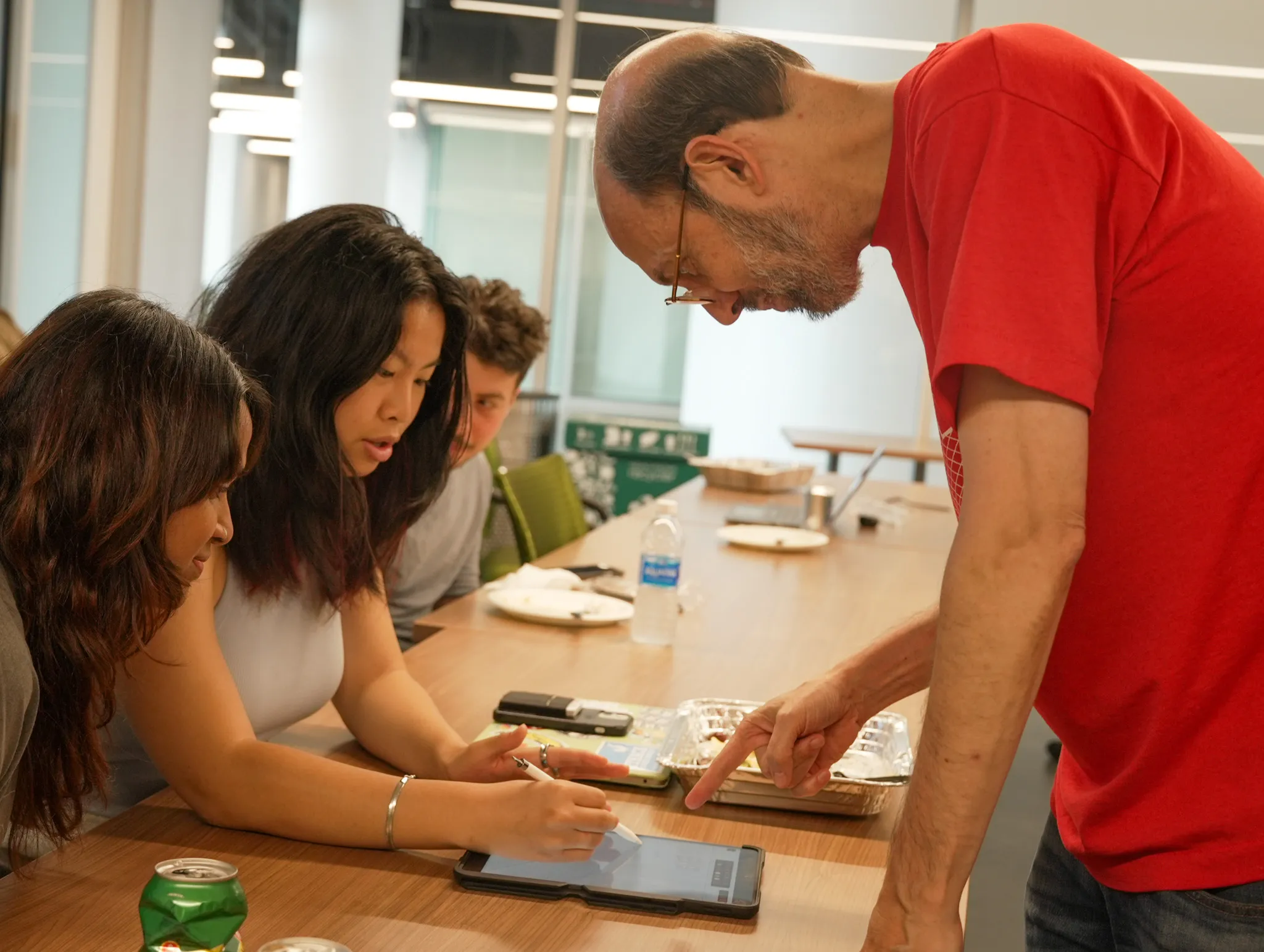
Twenty-three students from across the U.S. are gaining invaluable research skills at the University of Maryland this summer through a hands-on program sponsored by the National Science Foundation.
The Research Experiences for Undergraduates (REU) program—now in its 12th year at UMD—pairs students in small groups with Maryland faculty and graduate students, exploring diverse topics that include machine learning and AI, quantum simulation, parallel algorithms, and more.
Most visiting REU scholars—the majority of them undergraduates with a few high school students mixed in—receive a $7,000 stipend as well as room and board on the UMD campus from June 3 through August 9.
Bill Gasarch, a professor of computer science who started UMD’s involvement with the REU program in 2013, is the enthusiastic public face for its activities on the Maryland campus.*
Gasarch says the activities and benchmarks of success during a student’s 10-week stay are straightforward. “I want them to know how to read a paper, how to write a paper, how to give a talk and also get the experience of how to do meaningful research,” he says.
Liam Dorn is one of three high school students in this year’s REU cohort. Originally from Reno, Nevada, he’s spending the summer at Maryland before attending Columbia University this fall.
When Dorn was searching the internet for REU programs to consider—there are more than 700 programs offered nationwide each year—he recalls that UMD’s offerings stood out, partly because of Gasarch.
“You can tell just by reading the [Combinatorics, Algorithms and AI for Real Problems] website that they’re a pretty interesting person,” Dorn says. “That, combined with the fact they had testimonials of past students, with all of them saying it was a positive experience, made me think this would be a good environment for me to grow as a researcher and see if this is something I want to continue doing.”
Dorn is working with several other REU students that are examining the challenges that AI platforms face when answering questions that originate from images, video or audio sources.
This REU research thrust is being led by Jordan Boyd-Graber, an associate professor of computer science with an appointment in the University of Maryland Institute for Advanced Computer Studies (UMIACS), and Tasnim Kabir, a fifth-year doctoral student in computer science.
“Hopefully we will have a concrete outline, showing where computers actually struggle and when humans actually are superior to computers, and what computers can learn from humans,” Kabir says.
Another REU thrust involves classical and quantum error connection, both necessary to ensure that the answer a computational platform provides is accurate.
Victor Albert, a fellow in the Joint Center for Quantum Information and Computer Science (QuICS), is leading this effort along with Nat Tantivasadakarn, a postdoctoral research associate in theoretical physics at the California Institute of Technology.
Part of their team’s project will involve adding to the Error Correction Zoo, created by Albert and others to help categorize classical and quantum-error connection schemes, as well as the potential to scale it into other categories, such as topolog ical codes.
ical codes.
“The features outlined on that site are useful for protecting information,” Albert says (pictured left). “There's a little caveat though, in that the information that we're interested in protecting is not your cell signal or your hard drive, it's quantum information.”
While Albert had three REU students when he oversaw a similar project at UMD a year ago, this year there is only one, Alex Leonardi, who is entering his senior year at Harvard.
Leonardi said he was drawn to the program partly because of Tantivasadakarn. While conducting research based on novel techniques in quantum information science authored by many of Tantivasadakarn’s peers, Leonardi came across one of Tantivasadakarn’s papers and became a fan of his work.
“I realized, ‘This looks like the next step of applying what the other [researchers and myself] were doing,’” Leonardi recalls. “That's why I wanted to go and explore that area further.”
Other research thrusts active this summer under Gasarch’s leadership are:
• A team led by Laxman Dhulipala, an assistant professor of computer science with an appointment with UMIACS, and Tobias Rubel, a fourth-year computer science doctoral student, are exploring parallel algorithms for the “Nearest Neighbor Search,” which finds the closest or most similar data point to any given query point. This project aims to create an alternate algorithm which finds the approximate nearest neighbor.
• A team led by David Mount, a professor of computer science with an appointment in UMIACS, and Auguste Gezalyan, a fourth-year computer science doctoral student, is exploring the Hilbert Metric from the perspective of computational geometry.
• A team led by Aviva Prins, a fifth-year computer science doctoral student, is working with a nonprofit organization to build a tool to optimize support for crop planning advice for farmers.
• A team led by Seyed Sajjad Nezhadi, a fifth-year computer science doctoral student, and Jon Nelson, fourth-year computer science doctoral student, is studying graph properties related to, or derived from, graph homomorphisms, and are then comparing them to other quantum and classic properties of graphs.
• A team led by Andrew Childs, a professor of computer science and QuICS fellow, and James Watson, a postdoctoral researcher in QuICS, is developing methods for calculating product formula error bounds and implementing them in software that can be used for quantum simulation.
—Story by Shaun Chornobroff, UMIACS Communications Group
*Gasarch started UMD’s involvement with NSF’s REU program. In 2024, there are three other REU’s active on the Maryland campus in addition to the one led by Gasarch: The Center for Bioinformatics and Computational Biology is hosting an REU on bioinformatics and data science for genomics; Maria Cameron, a professor of mathematics and member of the UMD Center for Machine Learning, is leading an REU on modern topics in pure and applied mathematics; and the Institute for Trustworthy AI in Law & Society is running an REU focused on participatory design, methods and metrics, and evaluating trust.